Advance Accounting Principles Report: AASB 2 and iSignthis Limited
VerifiedAdded on 2020/05/28
|8
|1934
|69
Report
AI Summary
This report delves into the intricacies of AASB 2, focusing on share-based payment disclosure requirements. It begins with a business memorandum outlining the necessary disclosures for Alpha Ltd's share option plan, detailing equity-settled transactions, vesting conditions, and the importance of fair value measurement. The report then examines the annual report of iSignthis Limited, an ASX-listed company, to assess its compliance with AASB 2. The analysis reveals that iSignthis Limited's disclosures are insufficient, lacking critical information regarding share valuation techniques, vesting conditions, and the nature of the share-based payment transactions. The report highlights the importance of comprehensive disclosures to ensure transparency and adherence to accounting standards, providing a comprehensive overview of the accounting treatment of share-based payments and their impact on financial reporting.
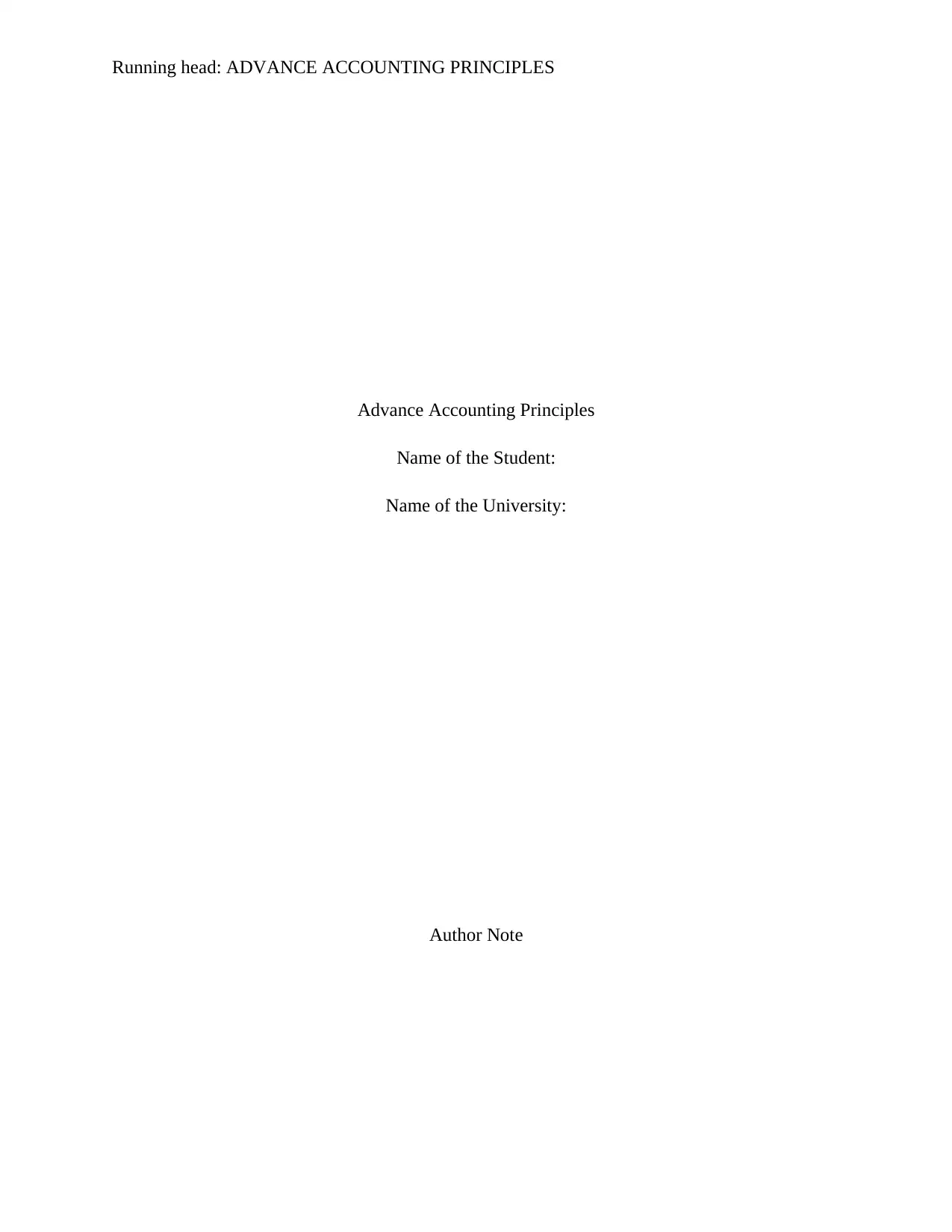
Running head: ADVANCE ACCOUNTING PRINCIPLES
Advance Accounting Principles
Name of the Student:
Name of the University:
Author Note
Advance Accounting Principles
Name of the Student:
Name of the University:
Author Note
Paraphrase This Document
Need a fresh take? Get an instant paraphrase of this document with our AI Paraphraser
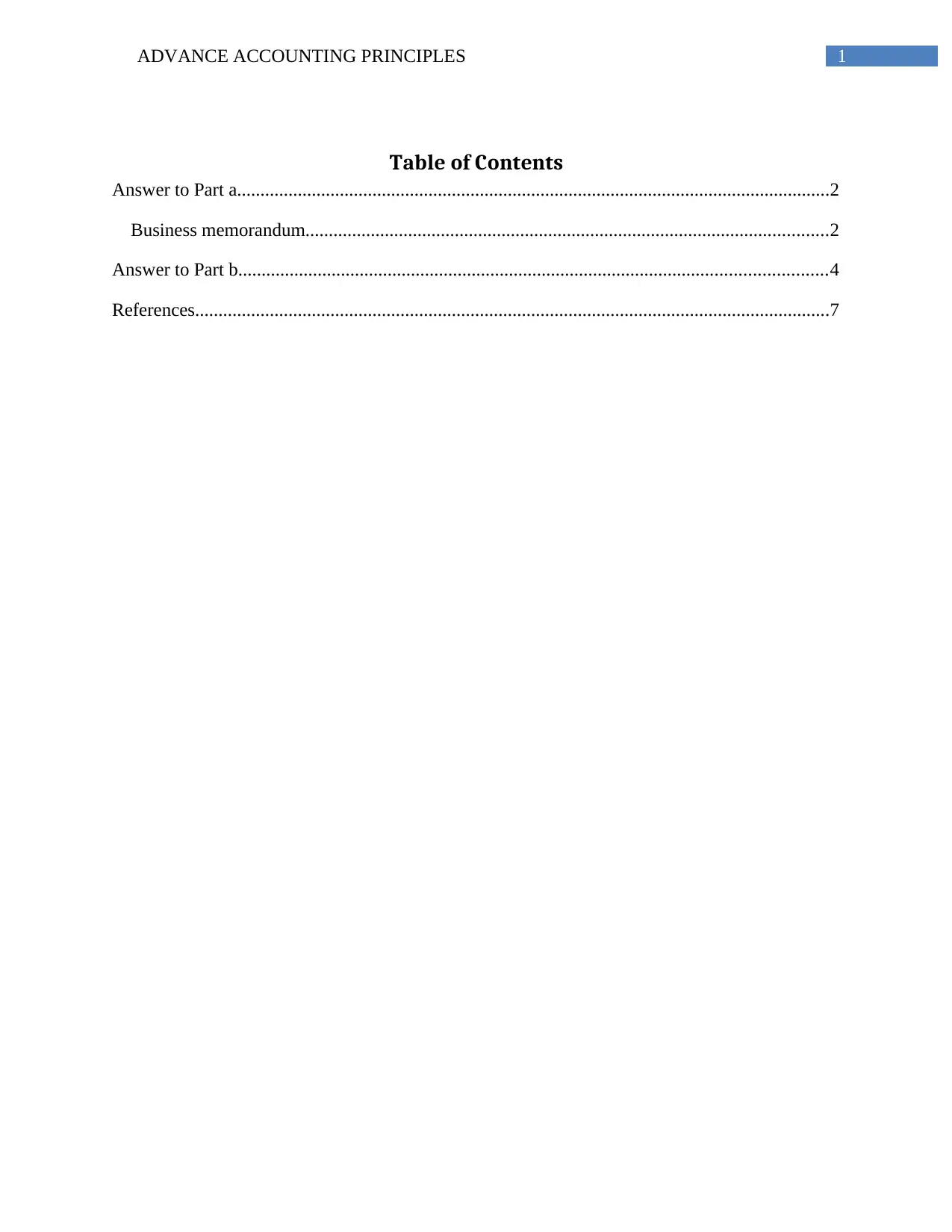
1ADVANCE ACCOUNTING PRINCIPLES
Table of Contents
Answer to Part a...............................................................................................................................2
Business memorandum................................................................................................................2
Answer to Part b..............................................................................................................................4
References........................................................................................................................................7
Table of Contents
Answer to Part a...............................................................................................................................2
Business memorandum................................................................................................................2
Answer to Part b..............................................................................................................................4
References........................................................................................................................................7
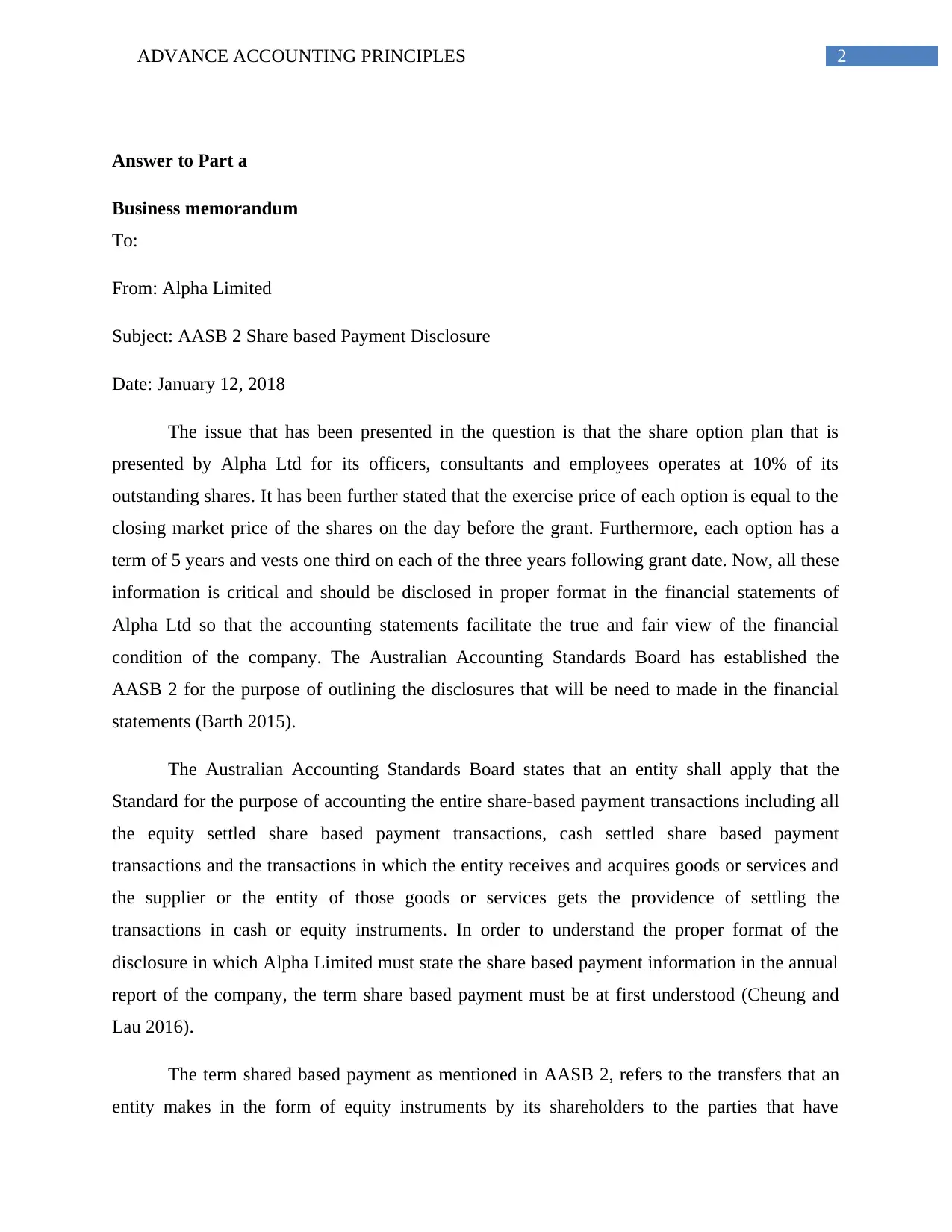
2ADVANCE ACCOUNTING PRINCIPLES
Answer to Part a
Business memorandum
To:
From: Alpha Limited
Subject: AASB 2 Share based Payment Disclosure
Date: January 12, 2018
The issue that has been presented in the question is that the share option plan that is
presented by Alpha Ltd for its officers, consultants and employees operates at 10% of its
outstanding shares. It has been further stated that the exercise price of each option is equal to the
closing market price of the shares on the day before the grant. Furthermore, each option has a
term of 5 years and vests one third on each of the three years following grant date. Now, all these
information is critical and should be disclosed in proper format in the financial statements of
Alpha Ltd so that the accounting statements facilitate the true and fair view of the financial
condition of the company. The Australian Accounting Standards Board has established the
AASB 2 for the purpose of outlining the disclosures that will be need to made in the financial
statements (Barth 2015).
The Australian Accounting Standards Board states that an entity shall apply that the
Standard for the purpose of accounting the entire share-based payment transactions including all
the equity settled share based payment transactions, cash settled share based payment
transactions and the transactions in which the entity receives and acquires goods or services and
the supplier or the entity of those goods or services gets the providence of settling the
transactions in cash or equity instruments. In order to understand the proper format of the
disclosure in which Alpha Limited must state the share based payment information in the annual
report of the company, the term share based payment must be at first understood (Cheung and
Lau 2016).
The term shared based payment as mentioned in AASB 2, refers to the transfers that an
entity makes in the form of equity instruments by its shareholders to the parties that have
Answer to Part a
Business memorandum
To:
From: Alpha Limited
Subject: AASB 2 Share based Payment Disclosure
Date: January 12, 2018
The issue that has been presented in the question is that the share option plan that is
presented by Alpha Ltd for its officers, consultants and employees operates at 10% of its
outstanding shares. It has been further stated that the exercise price of each option is equal to the
closing market price of the shares on the day before the grant. Furthermore, each option has a
term of 5 years and vests one third on each of the three years following grant date. Now, all these
information is critical and should be disclosed in proper format in the financial statements of
Alpha Ltd so that the accounting statements facilitate the true and fair view of the financial
condition of the company. The Australian Accounting Standards Board has established the
AASB 2 for the purpose of outlining the disclosures that will be need to made in the financial
statements (Barth 2015).
The Australian Accounting Standards Board states that an entity shall apply that the
Standard for the purpose of accounting the entire share-based payment transactions including all
the equity settled share based payment transactions, cash settled share based payment
transactions and the transactions in which the entity receives and acquires goods or services and
the supplier or the entity of those goods or services gets the providence of settling the
transactions in cash or equity instruments. In order to understand the proper format of the
disclosure in which Alpha Limited must state the share based payment information in the annual
report of the company, the term share based payment must be at first understood (Cheung and
Lau 2016).
The term shared based payment as mentioned in AASB 2, refers to the transfers that an
entity makes in the form of equity instruments by its shareholders to the parties that have
⊘ This is a preview!⊘
Do you want full access?
Subscribe today to unlock all pages.

Trusted by 1+ million students worldwide
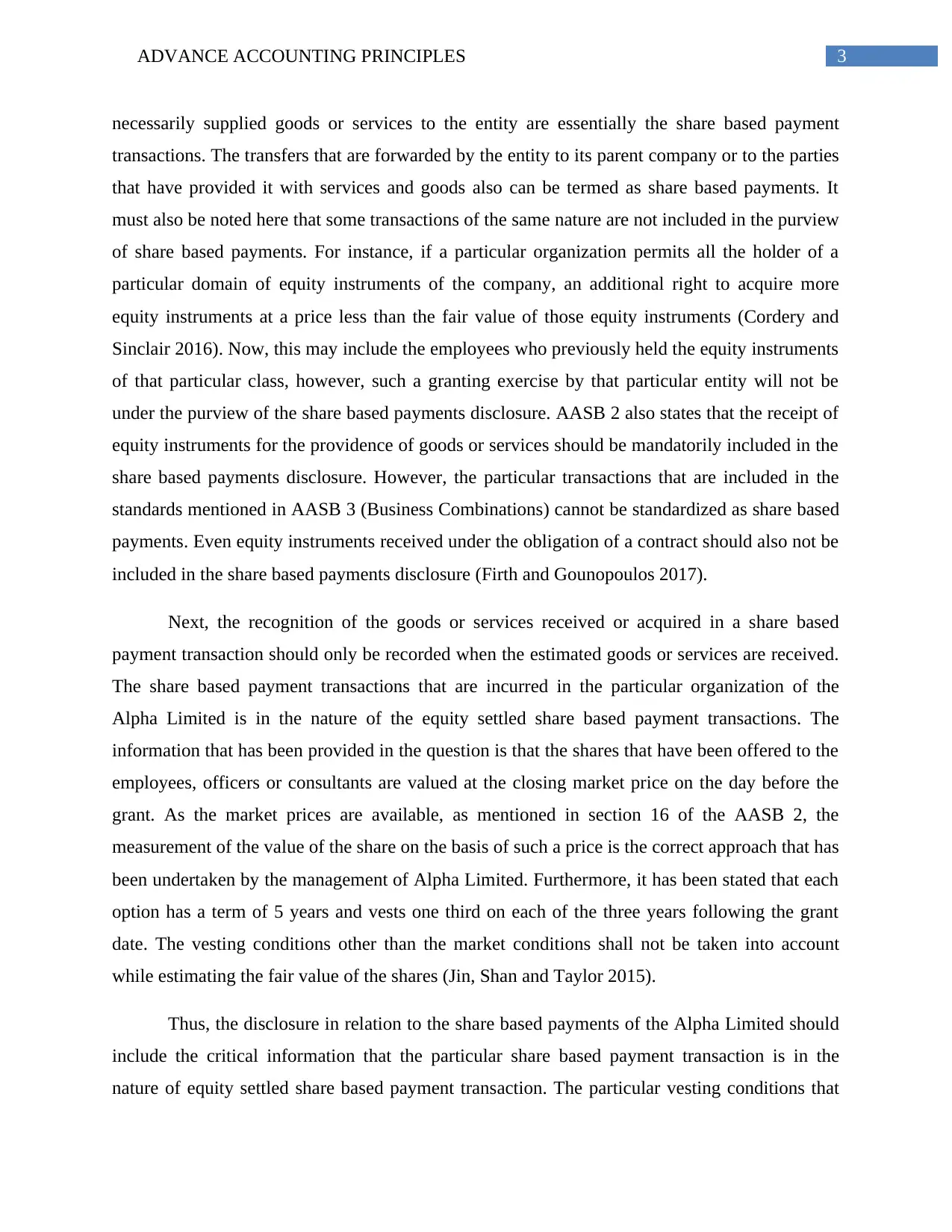
3ADVANCE ACCOUNTING PRINCIPLES
necessarily supplied goods or services to the entity are essentially the share based payment
transactions. The transfers that are forwarded by the entity to its parent company or to the parties
that have provided it with services and goods also can be termed as share based payments. It
must also be noted here that some transactions of the same nature are not included in the purview
of share based payments. For instance, if a particular organization permits all the holder of a
particular domain of equity instruments of the company, an additional right to acquire more
equity instruments at a price less than the fair value of those equity instruments (Cordery and
Sinclair 2016). Now, this may include the employees who previously held the equity instruments
of that particular class, however, such a granting exercise by that particular entity will not be
under the purview of the share based payments disclosure. AASB 2 also states that the receipt of
equity instruments for the providence of goods or services should be mandatorily included in the
share based payments disclosure. However, the particular transactions that are included in the
standards mentioned in AASB 3 (Business Combinations) cannot be standardized as share based
payments. Even equity instruments received under the obligation of a contract should also not be
included in the share based payments disclosure (Firth and Gounopoulos 2017).
Next, the recognition of the goods or services received or acquired in a share based
payment transaction should only be recorded when the estimated goods or services are received.
The share based payment transactions that are incurred in the particular organization of the
Alpha Limited is in the nature of the equity settled share based payment transactions. The
information that has been provided in the question is that the shares that have been offered to the
employees, officers or consultants are valued at the closing market price on the day before the
grant. As the market prices are available, as mentioned in section 16 of the AASB 2, the
measurement of the value of the share on the basis of such a price is the correct approach that has
been undertaken by the management of Alpha Limited. Furthermore, it has been stated that each
option has a term of 5 years and vests one third on each of the three years following the grant
date. The vesting conditions other than the market conditions shall not be taken into account
while estimating the fair value of the shares (Jin, Shan and Taylor 2015).
Thus, the disclosure in relation to the share based payments of the Alpha Limited should
include the critical information that the particular share based payment transaction is in the
nature of equity settled share based payment transaction. The particular vesting conditions that
necessarily supplied goods or services to the entity are essentially the share based payment
transactions. The transfers that are forwarded by the entity to its parent company or to the parties
that have provided it with services and goods also can be termed as share based payments. It
must also be noted here that some transactions of the same nature are not included in the purview
of share based payments. For instance, if a particular organization permits all the holder of a
particular domain of equity instruments of the company, an additional right to acquire more
equity instruments at a price less than the fair value of those equity instruments (Cordery and
Sinclair 2016). Now, this may include the employees who previously held the equity instruments
of that particular class, however, such a granting exercise by that particular entity will not be
under the purview of the share based payments disclosure. AASB 2 also states that the receipt of
equity instruments for the providence of goods or services should be mandatorily included in the
share based payments disclosure. However, the particular transactions that are included in the
standards mentioned in AASB 3 (Business Combinations) cannot be standardized as share based
payments. Even equity instruments received under the obligation of a contract should also not be
included in the share based payments disclosure (Firth and Gounopoulos 2017).
Next, the recognition of the goods or services received or acquired in a share based
payment transaction should only be recorded when the estimated goods or services are received.
The share based payment transactions that are incurred in the particular organization of the
Alpha Limited is in the nature of the equity settled share based payment transactions. The
information that has been provided in the question is that the shares that have been offered to the
employees, officers or consultants are valued at the closing market price on the day before the
grant. As the market prices are available, as mentioned in section 16 of the AASB 2, the
measurement of the value of the share on the basis of such a price is the correct approach that has
been undertaken by the management of Alpha Limited. Furthermore, it has been stated that each
option has a term of 5 years and vests one third on each of the three years following the grant
date. The vesting conditions other than the market conditions shall not be taken into account
while estimating the fair value of the shares (Jin, Shan and Taylor 2015).
Thus, the disclosure in relation to the share based payments of the Alpha Limited should
include the critical information that the particular share based payment transaction is in the
nature of equity settled share based payment transaction. The particular vesting conditions that
Paraphrase This Document
Need a fresh take? Get an instant paraphrase of this document with our AI Paraphraser
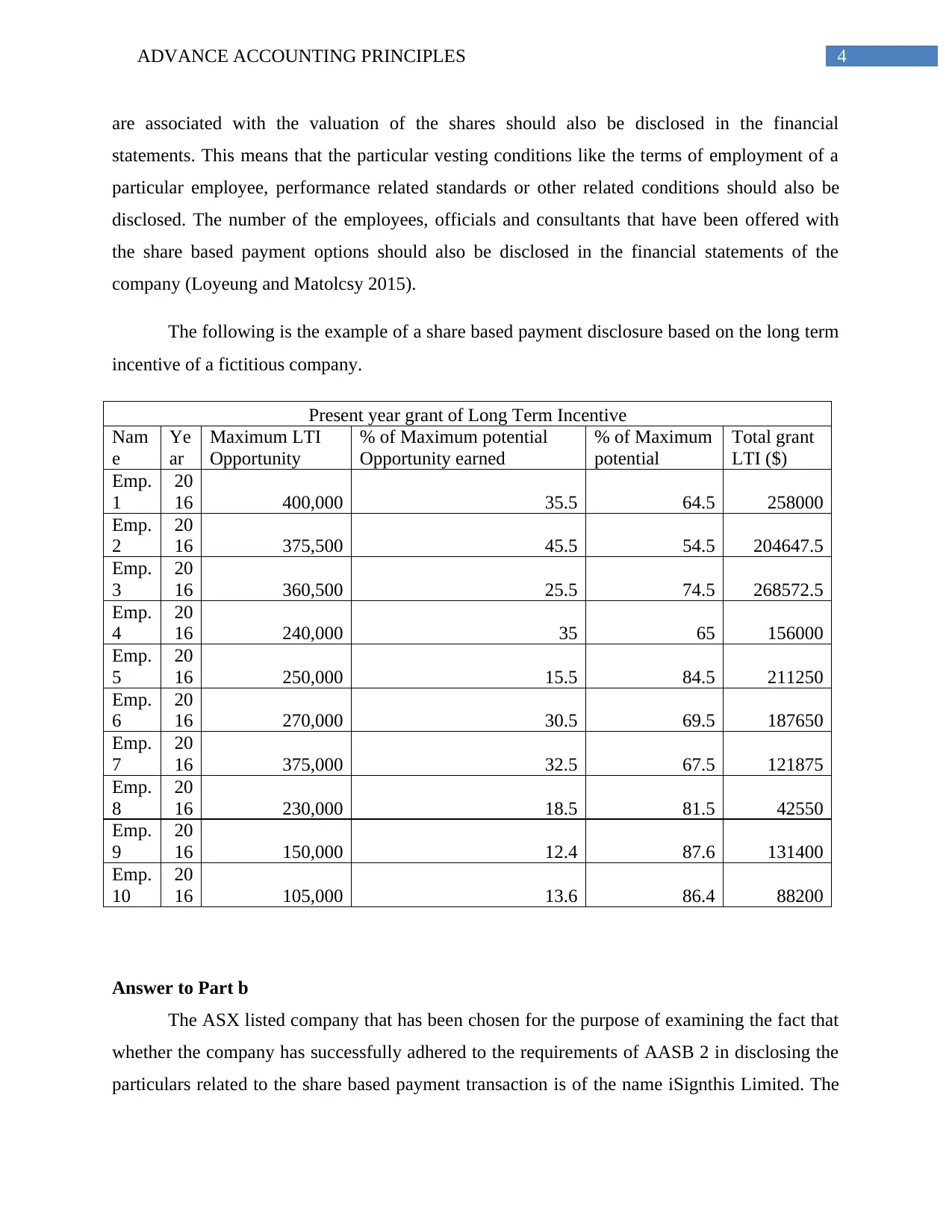
4ADVANCE ACCOUNTING PRINCIPLES
are associated with the valuation of the shares should also be disclosed in the financial
statements. This means that the particular vesting conditions like the terms of employment of a
particular employee, performance related standards or other related conditions should also be
disclosed. The number of the employees, officials and consultants that have been offered with
the share based payment options should also be disclosed in the financial statements of the
company (Loyeung and Matolcsy 2015).
The following is the example of a share based payment disclosure based on the long term
incentive of a fictitious company.
Present year grant of Long Term Incentive
Nam
e
Ye
ar
Maximum LTI
Opportunity
% of Maximum potential
Opportunity earned
% of Maximum
potential
Total grant
LTI ($)
Emp.
1
20
16 400,000 35.5 64.5 258000
Emp.
2
20
16 375,500 45.5 54.5 204647.5
Emp.
3
20
16 360,500 25.5 74.5 268572.5
Emp.
4
20
16 240,000 35 65 156000
Emp.
5
20
16 250,000 15.5 84.5 211250
Emp.
6
20
16 270,000 30.5 69.5 187650
Emp.
7
20
16 375,000 32.5 67.5 121875
Emp.
8
20
16 230,000 18.5 81.5 42550
Emp.
9
20
16 150,000 12.4 87.6 131400
Emp.
10
20
16 105,000 13.6 86.4 88200
Answer to Part b
The ASX listed company that has been chosen for the purpose of examining the fact that
whether the company has successfully adhered to the requirements of AASB 2 in disclosing the
particulars related to the share based payment transaction is of the name iSignthis Limited. The
are associated with the valuation of the shares should also be disclosed in the financial
statements. This means that the particular vesting conditions like the terms of employment of a
particular employee, performance related standards or other related conditions should also be
disclosed. The number of the employees, officials and consultants that have been offered with
the share based payment options should also be disclosed in the financial statements of the
company (Loyeung and Matolcsy 2015).
The following is the example of a share based payment disclosure based on the long term
incentive of a fictitious company.
Present year grant of Long Term Incentive
Nam
e
Ye
ar
Maximum LTI
Opportunity
% of Maximum potential
Opportunity earned
% of Maximum
potential
Total grant
LTI ($)
Emp.
1
20
16 400,000 35.5 64.5 258000
Emp.
2
20
16 375,500 45.5 54.5 204647.5
Emp.
3
20
16 360,500 25.5 74.5 268572.5
Emp.
4
20
16 240,000 35 65 156000
Emp.
5
20
16 250,000 15.5 84.5 211250
Emp.
6
20
16 270,000 30.5 69.5 187650
Emp.
7
20
16 375,000 32.5 67.5 121875
Emp.
8
20
16 230,000 18.5 81.5 42550
Emp.
9
20
16 150,000 12.4 87.6 131400
Emp.
10
20
16 105,000 13.6 86.4 88200
Answer to Part b
The ASX listed company that has been chosen for the purpose of examining the fact that
whether the company has successfully adhered to the requirements of AASB 2 in disclosing the
particulars related to the share based payment transaction is of the name iSignthis Limited. The
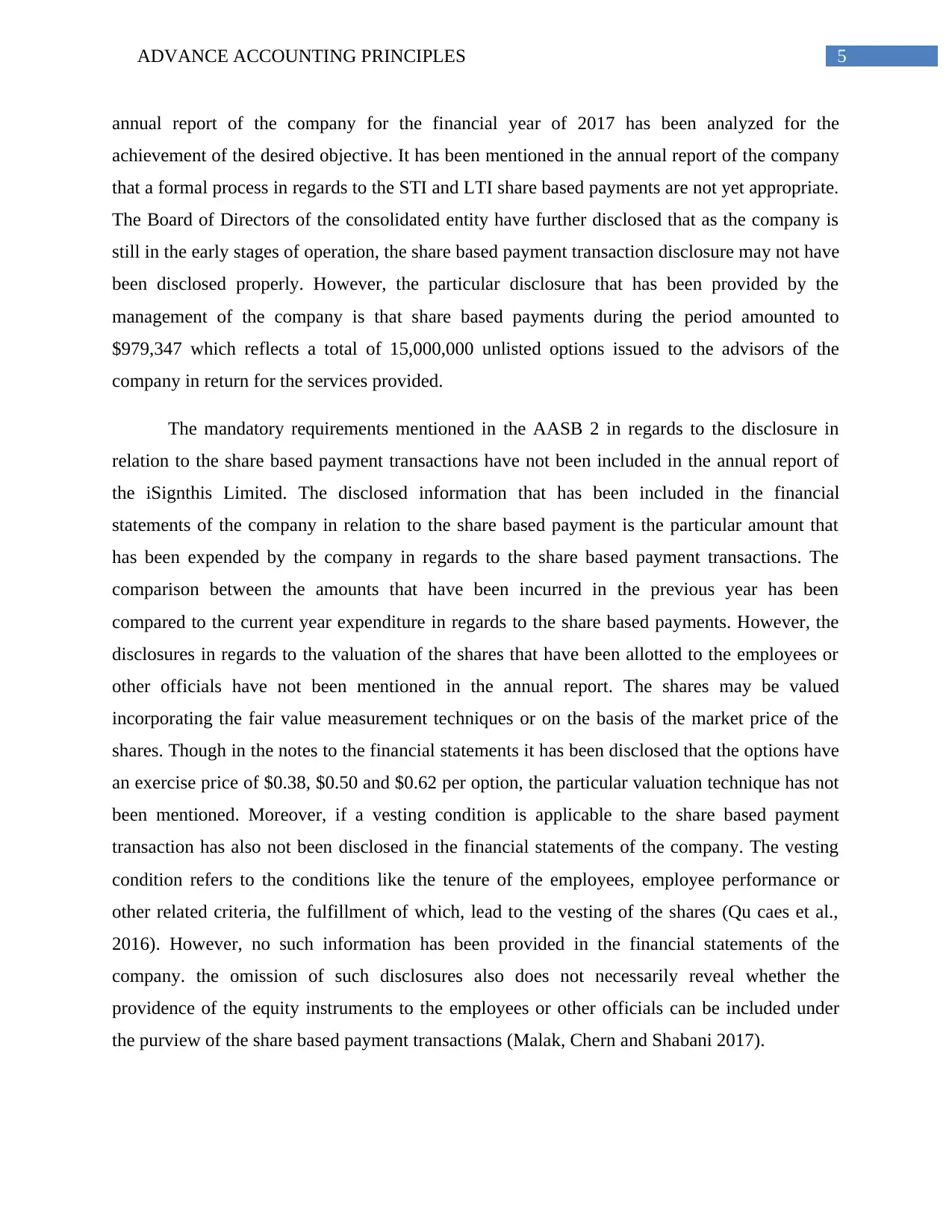
5ADVANCE ACCOUNTING PRINCIPLES
annual report of the company for the financial year of 2017 has been analyzed for the
achievement of the desired objective. It has been mentioned in the annual report of the company
that a formal process in regards to the STI and LTI share based payments are not yet appropriate.
The Board of Directors of the consolidated entity have further disclosed that as the company is
still in the early stages of operation, the share based payment transaction disclosure may not have
been disclosed properly. However, the particular disclosure that has been provided by the
management of the company is that share based payments during the period amounted to
$979,347 which reflects a total of 15,000,000 unlisted options issued to the advisors of the
company in return for the services provided.
The mandatory requirements mentioned in the AASB 2 in regards to the disclosure in
relation to the share based payment transactions have not been included in the annual report of
the iSignthis Limited. The disclosed information that has been included in the financial
statements of the company in relation to the share based payment is the particular amount that
has been expended by the company in regards to the share based payment transactions. The
comparison between the amounts that have been incurred in the previous year has been
compared to the current year expenditure in regards to the share based payments. However, the
disclosures in regards to the valuation of the shares that have been allotted to the employees or
other officials have not been mentioned in the annual report. The shares may be valued
incorporating the fair value measurement techniques or on the basis of the market price of the
shares. Though in the notes to the financial statements it has been disclosed that the options have
an exercise price of $0.38, $0.50 and $0.62 per option, the particular valuation technique has not
been mentioned. Moreover, if a vesting condition is applicable to the share based payment
transaction has also not been disclosed in the financial statements of the company. The vesting
condition refers to the conditions like the tenure of the employees, employee performance or
other related criteria, the fulfillment of which, lead to the vesting of the shares (Qu caes et al.,
2016). However, no such information has been provided in the financial statements of the
company. the omission of such disclosures also does not necessarily reveal whether the
providence of the equity instruments to the employees or other officials can be included under
the purview of the share based payment transactions (Malak, Chern and Shabani 2017).
annual report of the company for the financial year of 2017 has been analyzed for the
achievement of the desired objective. It has been mentioned in the annual report of the company
that a formal process in regards to the STI and LTI share based payments are not yet appropriate.
The Board of Directors of the consolidated entity have further disclosed that as the company is
still in the early stages of operation, the share based payment transaction disclosure may not have
been disclosed properly. However, the particular disclosure that has been provided by the
management of the company is that share based payments during the period amounted to
$979,347 which reflects a total of 15,000,000 unlisted options issued to the advisors of the
company in return for the services provided.
The mandatory requirements mentioned in the AASB 2 in regards to the disclosure in
relation to the share based payment transactions have not been included in the annual report of
the iSignthis Limited. The disclosed information that has been included in the financial
statements of the company in relation to the share based payment is the particular amount that
has been expended by the company in regards to the share based payment transactions. The
comparison between the amounts that have been incurred in the previous year has been
compared to the current year expenditure in regards to the share based payments. However, the
disclosures in regards to the valuation of the shares that have been allotted to the employees or
other officials have not been mentioned in the annual report. The shares may be valued
incorporating the fair value measurement techniques or on the basis of the market price of the
shares. Though in the notes to the financial statements it has been disclosed that the options have
an exercise price of $0.38, $0.50 and $0.62 per option, the particular valuation technique has not
been mentioned. Moreover, if a vesting condition is applicable to the share based payment
transaction has also not been disclosed in the financial statements of the company. The vesting
condition refers to the conditions like the tenure of the employees, employee performance or
other related criteria, the fulfillment of which, lead to the vesting of the shares (Qu caes et al.,
2016). However, no such information has been provided in the financial statements of the
company. the omission of such disclosures also does not necessarily reveal whether the
providence of the equity instruments to the employees or other officials can be included under
the purview of the share based payment transactions (Malak, Chern and Shabani 2017).
⊘ This is a preview!⊘
Do you want full access?
Subscribe today to unlock all pages.

Trusted by 1+ million students worldwide
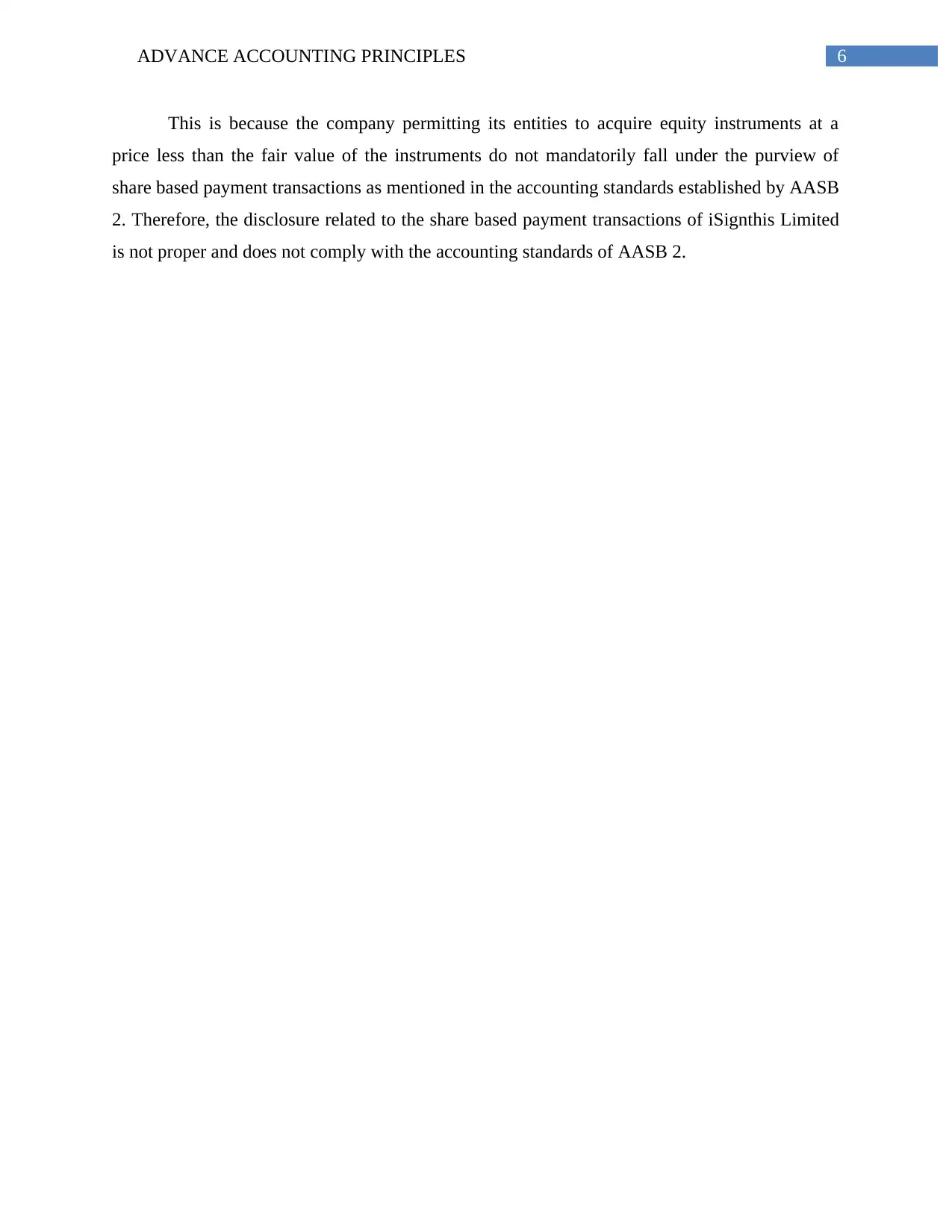
6ADVANCE ACCOUNTING PRINCIPLES
This is because the company permitting its entities to acquire equity instruments at a
price less than the fair value of the instruments do not mandatorily fall under the purview of
share based payment transactions as mentioned in the accounting standards established by AASB
2. Therefore, the disclosure related to the share based payment transactions of iSignthis Limited
is not proper and does not comply with the accounting standards of AASB 2.
This is because the company permitting its entities to acquire equity instruments at a
price less than the fair value of the instruments do not mandatorily fall under the purview of
share based payment transactions as mentioned in the accounting standards established by AASB
2. Therefore, the disclosure related to the share based payment transactions of iSignthis Limited
is not proper and does not comply with the accounting standards of AASB 2.
Paraphrase This Document
Need a fresh take? Get an instant paraphrase of this document with our AI Paraphraser
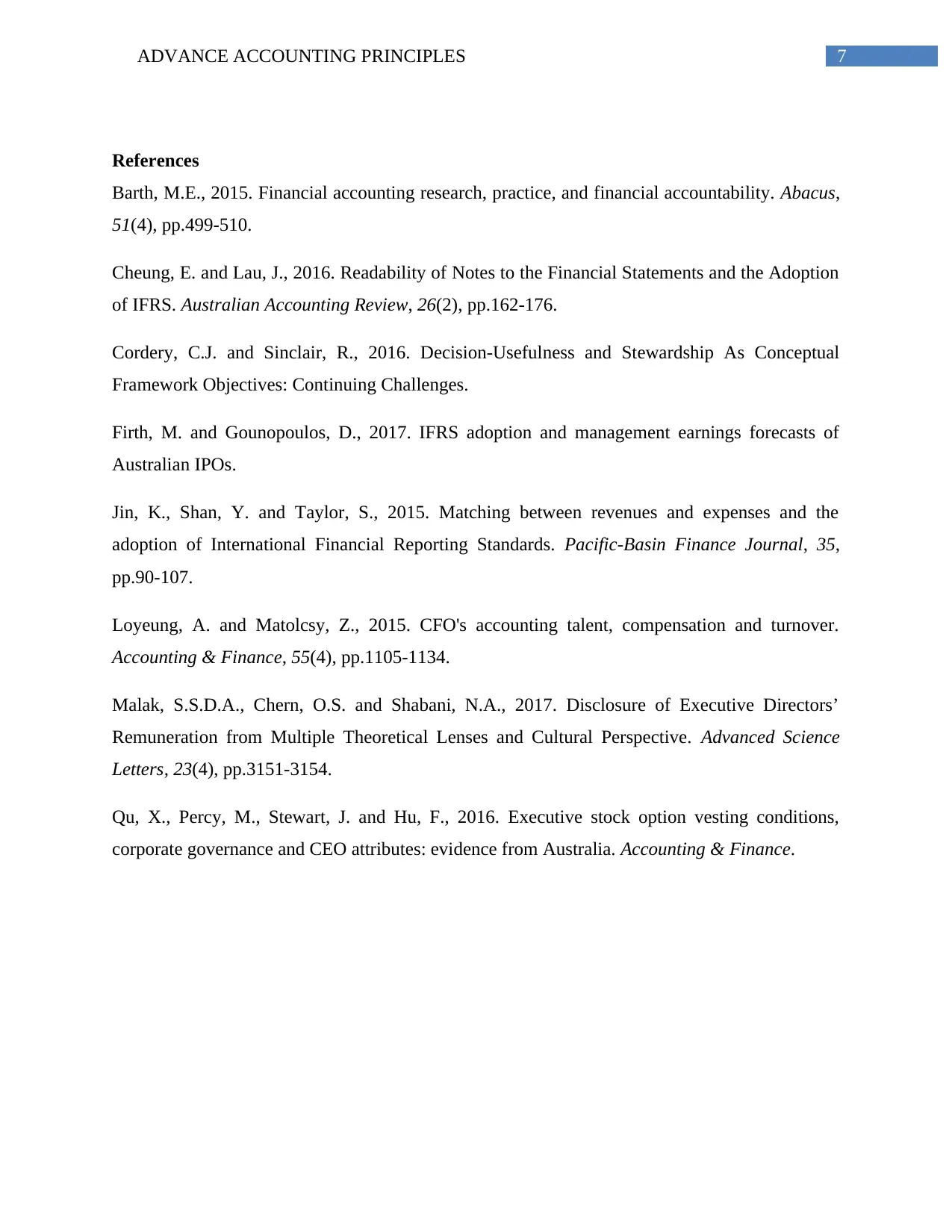
7ADVANCE ACCOUNTING PRINCIPLES
References
Barth, M.E., 2015. Financial accounting research, practice, and financial accountability. Abacus,
51(4), pp.499-510.
Cheung, E. and Lau, J., 2016. Readability of Notes to the Financial Statements and the Adoption
of IFRS. Australian Accounting Review, 26(2), pp.162-176.
Cordery, C.J. and Sinclair, R., 2016. Decision-Usefulness and Stewardship As Conceptual
Framework Objectives: Continuing Challenges.
Firth, M. and Gounopoulos, D., 2017. IFRS adoption and management earnings forecasts of
Australian IPOs.
Jin, K., Shan, Y. and Taylor, S., 2015. Matching between revenues and expenses and the
adoption of International Financial Reporting Standards. Pacific-Basin Finance Journal, 35,
pp.90-107.
Loyeung, A. and Matolcsy, Z., 2015. CFO's accounting talent, compensation and turnover.
Accounting & Finance, 55(4), pp.1105-1134.
Malak, S.S.D.A., Chern, O.S. and Shabani, N.A., 2017. Disclosure of Executive Directors’
Remuneration from Multiple Theoretical Lenses and Cultural Perspective. Advanced Science
Letters, 23(4), pp.3151-3154.
Qu, X., Percy, M., Stewart, J. and Hu, F., 2016. Executive stock option vesting conditions,
corporate governance and CEO attributes: evidence from Australia. Accounting & Finance.
References
Barth, M.E., 2015. Financial accounting research, practice, and financial accountability. Abacus,
51(4), pp.499-510.
Cheung, E. and Lau, J., 2016. Readability of Notes to the Financial Statements and the Adoption
of IFRS. Australian Accounting Review, 26(2), pp.162-176.
Cordery, C.J. and Sinclair, R., 2016. Decision-Usefulness and Stewardship As Conceptual
Framework Objectives: Continuing Challenges.
Firth, M. and Gounopoulos, D., 2017. IFRS adoption and management earnings forecasts of
Australian IPOs.
Jin, K., Shan, Y. and Taylor, S., 2015. Matching between revenues and expenses and the
adoption of International Financial Reporting Standards. Pacific-Basin Finance Journal, 35,
pp.90-107.
Loyeung, A. and Matolcsy, Z., 2015. CFO's accounting talent, compensation and turnover.
Accounting & Finance, 55(4), pp.1105-1134.
Malak, S.S.D.A., Chern, O.S. and Shabani, N.A., 2017. Disclosure of Executive Directors’
Remuneration from Multiple Theoretical Lenses and Cultural Perspective. Advanced Science
Letters, 23(4), pp.3151-3154.
Qu, X., Percy, M., Stewart, J. and Hu, F., 2016. Executive stock option vesting conditions,
corporate governance and CEO attributes: evidence from Australia. Accounting & Finance.
1 out of 8
Related Documents
Your All-in-One AI-Powered Toolkit for Academic Success.
+13062052269
info@desklib.com
Available 24*7 on WhatsApp / Email
![[object Object]](/_next/static/media/star-bottom.7253800d.svg)
Unlock your academic potential
Copyright © 2020–2025 A2Z Services. All Rights Reserved. Developed and managed by ZUCOL.





